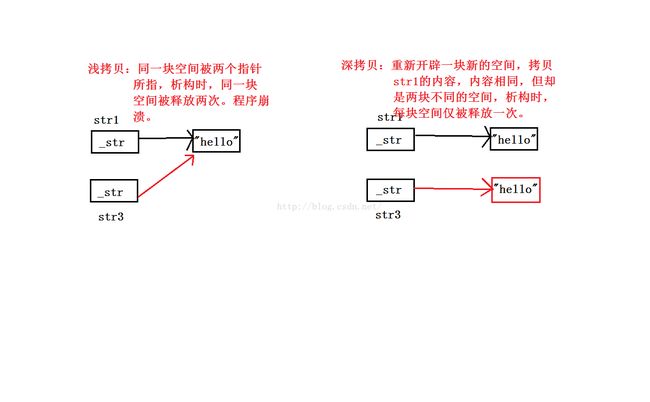模拟实现String类(1)_深拷贝
"test.cpp"
#define _CRT_SECURE_NO_WARNINGS 1
#include <iostream>
using namespace std;
#include "Sring.h"
void Test1()
{
String str1("hello");
cout<<str1<<endl;
String str2("haha");
cout<<str2<<endl;
String str3(str1);
cout<<str3<<endl;
}
void Test2()
{
String str1("hello");
cout<<str1<<endl;
String str2;
str2 = str1;
cout<<str2<<endl;
}
void Test3()
{
String str1("hallo");
cout<<str1<<endl;
cout<<strlen(str1.c_str())<<endl;
str1[1] = 'e';
cout<<str1<<endl;
}
void Test4()
{
String str1("hello");
str1.PushBack('a');
cout<<str1<<endl;
String str2("hello");
str2.PushBack(" world");
cout<<str2<<endl;
cout<<str2.Size()<<endl;
cout<<str2.Capacity()<<endl;
}
void Test5()
{
String s1("hello");
String s2("who");
s1.Insert(3,s2);
cout<<s1<<endl;
cout<<s1.Size()<<endl;
String s3("abcdefghi");
s3.Erase(2,3);
cout<<s3<<endl;
cout<<s3.Size()<<endl;
}
int main()
{
//Test1();
//Test2();
//Test3();
//Test4();
Test5();
system("pause");
return 0;
}
"String.h"
#pragma once
#include <assert.h>
#include <string>
class String
{
friend ostream& operator<<(ostream& os,String& str);
public:
//构造函数
String(const char* str = "")//缺省给一个空字符串,使求长度的时候,不会出现错误
:_size(strlen(str))
,_capacity(strlen(str)+1)//容量多加一个是放'\0'
,_str(new char[_capacity])
{
strcpy(_str,str);
}
//析构函数
~String()
{
if (_str)
{
delete[] _str;
_str = NULL;
_size = 0;
_capacity = 0;
}
}
//拷贝构造函数
String(const String& s)
:_size(s._size)
,_capacity(s._capacity)
,_str(new char[_capacity])
{
//深拷贝,给_str一块自己的空间,使两个指针分别指向两个不同的空间
strcpy(_str,s._str);
}
////传统写法
//String& operator=(const String& s)
//{
// //防止自身给自身赋值
// if (this != &str)
// {
// delete[] _str;
// _str = new char[strlen(s._str)+1];
// strcpy(_str,s._str);
// //错误示范
// //刚开始最后一句写成了_str = s._str
// //造成了浅拷贝的错误
// //同一块空间被释放两次导致程序错误
// }
// return *this;
//}
//现代写法,强盗式逻辑
String& operator=(String s)
{
swap(_size,s._size);
swap(_capacity,s._capacity);
swap(_str,s._str);
return *this;
}
char* c_str()
{
return _str;
}
char& operator[](int index)
{
return _str[index];
}
void PushBack(char ch)
{
CheckCapacity(1);
//_str[_size] = ch;
//_size++;
//_str[_size] = '\0';
_str[_size++] = ch;
_str[_size] = '\0';//最后一个字符一定要记得放入一个'\0'
}
void PushBack(char* str)
{
CheckCapacity(strlen(str));
char* tmp1 = _str;
while (*tmp1)
{
tmp1++;
}
char* tmp2 = str;
while (*tmp2)
{
*tmp1++ = *tmp2++;
}
*tmp1 = '\0';
_size += strlen(str);
}
size_t Size()
{
return _size;
}
size_t Capacity()
{
return _capacity;
}
bool Empty()
{
if (_str)
{
return false;
}
else
{
return true;
}
}
String& Insert(size_t pos, const String& s)
{
CheckCapacity(strlen(s._str));
int size1 = _size;
int newsize1 = _size;
int size2 = s._size;
int newsize2 = s._size;
int count = size2;
//while (size2--)
//{
// _str[size1-1+count] = _str[size1-1];
// size1--;
//}
for (int i = size1-1;i >= pos;i--)
{
_str[i+count] = _str[i];
}
char* tmp = s._str;
while (count--)
{
_str[pos++] = *tmp++;
}
_size = newsize1+newsize2;
_str[_size] = '\0';
return *this;
}
String& Erase(size_t pos,size_t len)
{
int newlen = strlen(_str);
assert((pos >= 0) && (pos < newlen));
assert((len > 0) && (len <= newlen));
int size = strlen(_str) - len;
int count = len;
for (int i = pos;i < newlen;i++)
{
_str[i] = _str[i + len];
}
_str[size] = '\0';
_size -= count;
return *this;
}
protected:
void CheckCapacity(int count)
{
if ((_size+count) >= _capacity)
{
int _newcapacity =
(_size+count)>(2*_capacity)?
(_size+count):(2*_capacity);
_capacity = _newcapacity;
char* tmp = new char[_newcapacity];
strcpy(tmp,_str);
delete[] _str;
_str = tmp;
}
}
private:
size_t _size;
size_t _capacity;
char* _str;
};
ostream& operator<<(ostream& os,String& str)
{
os<<str._str;
return os;
}
